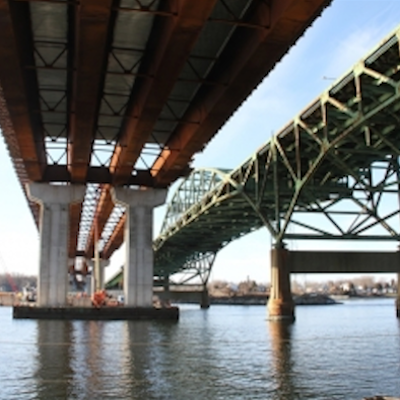The Ten Biggest Issues Facing the RI General Assembly in 2014
Tuesday, December 17, 2013
What does the 2014 Rhode Island General Assembly session have in store? GoLocal talked with elected officials and state leaders to get their take.
As the fiscal year 2015 budget will no doubt be the centerpiece of discussion and debate, one "x' factor that will likely play a major factor is a settlement in the state's pension lawsuit -- and how much that could be.
"While the budget certainly will need scrutiny, the 274 million ($112 local, $162 state) pound gorilla in the marble madhouse will be what the proposed mediated pension settlement will be and how the legislature wrestles with the gorilla in an election year," said Dan Beardsley, the Director of the RI League of Cities and Towns.
GET THE LATEST BREAKING NEWS HERE -- SIGN UP FOR GOLOCAL FREE DAILY EBLASTLisa Blais with the taxpayer group OSTPA similarly said that she was "waiting for the other shoe to drop -- name the result of mediated state 2011 pension reform."
While mediation talks are still taking place, GoLocal talked with elected officials, candidates, and leaders in the community as to what they saw as coming into focus for the coming General Assembly session.
See Major Issues Facing 2014 General Assembly BELOW
Economy, Economy, Economy
According to the Governor's office, Chafee's top 3 priorities for the upcoming legislative session are "the budget, the Rhode Island Turnpike and Bridge Authority (RITBA) Bridge maintenance/revenue stream, and 38 studios repayment."
The General Assembly leadership said they are focused squarely on the economy -- and jobs. “Speaker Fox believes that the House must continue its focus on improving the economy and creating jobs. That work began in the last session with the overhaul of the Commerce Department and many other initiatives involving job skills’ training, education, the reinstatement of the historic tax credit program, and adopting business-friendly policies such as biweekly pay. Many of the issues on Go Local’s list will be considered, but economic development will remain the highest priority," said Larry Berman, spokesman for Speaker of the House Gordon Fox.
“The economy will continue to be the Senate’s top priority in the 2014 session. The Senate will focus on the critical issue of workforce development," Greg Pare, spokesman to Senate President Teresa Paiva Weed told GoLocal. “The Senate looks forward to reviewing the recommendations of the many commissions which are presently meeting, including the commissions studying the sales tax and bridge tolls and the funding of our transportation infrastructure. We will work together with the Governor and the House of Representatives to review the Board of Education’s proposal.
While the approval of same-sex marriage proved to be one of the defining moments of the 2013 General Assembly session, several of last year's focal areas -- Sakonnet bridge tolls, the approval of the new Board of Education as well as the new Commerce Corporation to replace the EDC -- face the possibility of revisitation this year.
URI Distinguished Professor of Business Edward Mazze was highly critical of the potentially outstanding items. "Two terrible mistakes must be corrected - the micro-management of economic development which led to the restructuring of EDC and the elimination of the Board of Governors of Higher Education. Both activities have done little to create jobs, attract businesses and retain businesses. We need to have professionals manage these activities not legislators with their own agendas. The GA should consider a two year budget cycle for better planning and use of resources, support a Constitutional Convention to address issues such as consolidation of services, term limits for legislators, optimal number of legislators needed, ethical behavior of public officials and a better system of introducing legislation using a cost-benefit analysis approach," said Mazze.
Mazze continued, "2014 needs to be the year the GA moves away from three bad habits: 1, being known as the "let's make a deal" state; 2, thinking about what is good for the entire state rather than a small group of legislator's supporters, and 3, telling Rhode Islanders the truth when it comes to the realities of the Rhode Island economy such as tolls for the Sakonnet Bridge, the sales tax as a revenue source rather than an economic generator and the payment of 38 Studio bondholders by the insurance company guaranteeing the bonds rather than from public funds."
Bridge Funding
State Senator Lou DiPalma, whose district includes Middletown, Little Compton, Newport, Tiverton, was appointed to the Special Legislative Commission to "study the funding for bridges" established after last General Assembly's session saw tolls on the Sakonnet Bridge capped at 10 cents until April 2014 -- or until the commission came up with a funding proposal.
"First of all, Rhode Island transportation infrastructure affects all Rhode Island residents," said DiPalma. "It’s imperative we address RI’s transportation infrastructure. The time to act is now."
"From my perspective we need to address an approximately $1B funding problem over the next decade, including $800M for RIDOT, driven by bridge rehabilitation and statewide resurfacing, and $200M for the RITBA," said DiPalma, stating that "a toll on the Sakonnet Bridge is not appropriate for a variety of reasons, including its lack of equity and fairness to the residents and businesses of the East Bay, and particularly Newport County
DiPalma went on to say that he believed a solution can be developed "via a combination of using predominantly existing moneys from the General Fund and new sources of revenue".
Rhode Island GOP gubernatorial candidate Ken Block said with regard to the upcoming session that he is opposed to the bridge tolls. "The General Assembly must eliminate the Sakonnet Bridge tolls. It is unfair that a local community has been arbitrarily chosen to fund transportation infrastructure across the state."
Moreover, Block called for the entire budgetary process to be more transparent. "The General Assembly’s budget process is broken. There is almost no transparency and legislators are not given anywhere near the time they need to review the budget before the leadership pushes it through. The rushed process leads to mistakes like last session’s merger of the boards responsible for elementary/secondary and higher education. In 2014, I would like to see the General Assembly use an open process to create our budget instead of making major policy decisions behind closed doors at the last minute," said Block.
Fiscal Matters
Monique Chartier with the group RI Taxpayers said that looking at 2014, the General Assembly needed to address one specific development from last year --- that being the Waste and Fraud report.
"On the expenditure side, we need to ask: what has the Governor's office been doing with the Simpatico Waste and Fraud Report, tendered earlier this year?" asked Chartier. "The timeline of activity on Governor Chafee's website pertaining to this important report ends in March. It is estimated that the annual waste and fraud to be found in state spending easily exceeds the annual deficits that the state now faces. Implementation of the report would automatically remove all politics and all dread from the budget-cutting that Smith Hill must undertake in the face of these substantial deficits."
Meanwhile, Mike Stenhouse with the RI Center for Freedom and Prosperity said that "Rhode Islanders need a little R & R" in the upcoming session.
"The 2014 General Assembly session should be judged not by what new bills it passes, but rather, by what existing laws it reforms so as to encourage economic growth and individual responsibility. In that regard, the Center encourages legislators to give Rhode Islanders a little "R & R" via Repeal or Rollback of some of the more burdensome statutes that have proven harmful to our state," said Stenhouse. "Specific ideas include: repeal or rollback of the state Sales Tax; rollback of wasteful levels of state spending that are strangling our economy; repeal of laws that restrict parental choice when it comes to their children being forced to attend schools in their zip code, even if they are failing schools; rollback of Renewable Energy Mandates that result in higher energy costs for every family and that cost our state jobs; repeal of the state's punitive Estate Tax; repeal of the Minimum Corporate Tax; and rollback of the Minimum Wage to federal levels."
Constitutional Convention
One of the big ticket items that will likely be in contention to be on the ballot in 2014 is a constitutional convention question.
GOP candidate Block has been vocal in its backing. "I support a Constitutional Convention and I hope that Rhode Islanders approve it in 2014. We need to reform our system of government, starting with the General Assembly, and that is only possible through a Constitutional Convention. For example, we can restore the Ethics Commission’s authority to review and investigate actions by members of the General Assembly."
John Marion with Common Cause said that the notion of a convention should warrant a good deal of attention in the coming GA session -- but whether it is needed is a question of nuance and debate.
"Secretary of State Mollis has already said that if the General Assembly doesn't pass a resolution putting the Constitutional Convention question on the ballot, then he will. Therefore I expect we'll see the legislature pay much attention to the issue of the question itself," said Marion. "What I do think you'll see are important constitutional issues being raised by many parties (Common Cause included) with the expectation that the Assembly might put some of those on the ballot to ward off a convention. For a fifth consecutive year we will be trying to get the question of whether to close the loophole that exempts the General Assembly from most of the state's ethics laws on the ballot. Others will be pushing for amendments on the line-item veto, equal education funding, and probably other areas of constitutional change. Gary Sasse laid out that argument quite strongly in his recent GoLocal piece. We hope the Assembly listens.
Former Director of Administration Gary Sasse, who had questioned need for a Constitutional Convention in his earlier piece for GoLocal, shared his thoughts on the upcoming session, which included "economic development initiatives."
"Last year the General Assembly addressed the way the State will develop and implement economic policy. Hopefully this year they will address substantive issues that could improve Rhode Island's competitiveness. For example, tax reform and closing the educational achievement gap," said Sasse.
Related Slideshow: The Ten Biggest Issues Facing the RI General Assembly in 2014
Related Articles
- Arthur Schaper: Rhode Island General Assembly: Lower My Taxes!
- 10 Must-Watch General Assembly Races for 2012
- LISTEN - Top Ten Bills to Watch in Final Weeks of RI General Assembly
- General Assembly Nears End - Five Things You Need to Know
- Arthur Schaper: Shout Out to the RI General Assembly
- Rhode Island Experts Grade General Assembly Session on Business
- LISTEN- RI Leaders React to General Assembly Budget
- Block/RI Taxpayers Organization Challenge General Assembly on Economy
- The 10 Most Important Bills Facing the General Assembly
- Most Expensive General Assembly Races
- Carol Costa: General Assembly—Big Finish, Cliffhanger, Or Flop?
- The Ten Biggest Issues Facing the RI General Assembly in 2014
- NEW: Common Cause Renews Push for General Assembly Oversight
- Dan Lawlor: RI General Assembly: Fundraising or Lawmaking?
- The Top 20 General Assembly Races for November
- NEW: Education Reform Group Issues General Assembly Endorsements
- Dan Lawlor: Rhode Island Needs a Larger General Assembly
- Top 10 Most Important Issues of the 2013 General Assembly Session
- NEW: Fogarty Seeks End to Free Healthcare for General Assembly Members
- Dan Lawlor: Time to Hold General Assembly More Accountable
- Top Ten Bills to Watch in Final Weeks of RI General Assembly
- General Assembly Candidates Have Spent Nearly $2 Million
- Guest MINDSETTER™ Dean Fachon: All Hands on Deck in the General Assembly
- RI Leaders React to General Assembly Budget






2013.png)








2013_80_80_c1.png)








